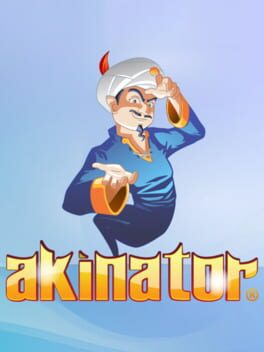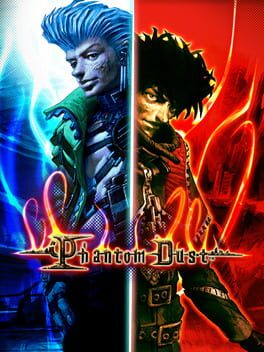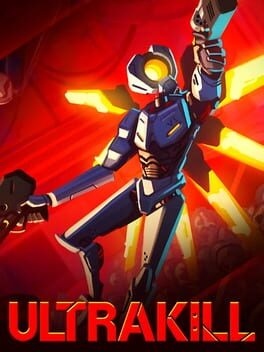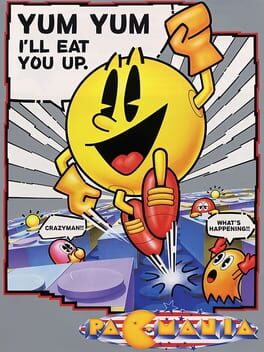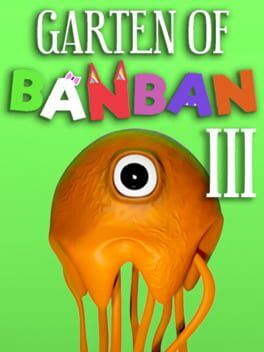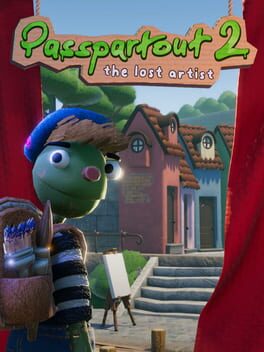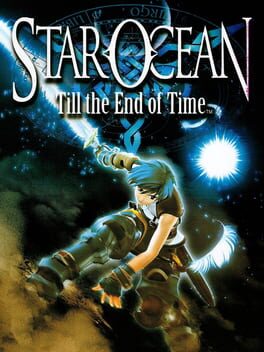IndiCrimson
9 reviews liked by IndiCrimson
Akinator
2007
Phantom Dust
2017
From the 1 hour I’ve played I’d love to get into it more as someone who is biased towards anything with card games growing up with Yugioh and Kingdom Hearts: Chain of Memories as my first KH game but I’d literally rather shatter into a thousand pieces than keep playing this on a keyboard (I am getting a controller lol)
Ultrakill
2020
Ultrakill
2020
Pac-Mania
1987
Pac-Mania: a 3D isometric sequel to Pac-Man where the titular Pac-Man can now jump as he progresses through mazes, released
in 1987.
36 Years later:
9pm at some barcade, I'm playing Capcom vs SNK which is situated around the same area as the Pac-Mania cabinet they had there.
This is the kind of barcade where everyone is going to play Mortal Kombat, which is fair but that also meant absolutely no one
was playing the nearby Pac-Mania or Capcom vs SNK cabinets really (besides only occasionally selecting Capcom characters in Capcom vs SNK to play a quick round).
I'm playing my match when this group of college kids start playing Pac-Mania and exclaim "what the hell is this" and "this not my Pac-Man"
and "this is not how Pac-Man works" and I think also a "this is not my beautiful apple". Little did these individuals know
was that I was a certified Pac-Maniac as at the time I learned that I somehow accumulated more hours in Pac-Mania on my Nintendo Switch than I did playing the
entirety of Super Mario Bros Wonder (collecting every Wonder Seed to 100%) which compared to Pac-Mania I tore up like it was a small little orange.
All of these tiny bits boil down into some real questions that have to be asked here that really will determine the quality of this game (at least in my opinion):
Is the 3D a gimmick? Is this a true successor to Pac-Man? Is funny game with chompy buddy and Lego bricks good?
I'm not gonna pretend like I'm the defacto video game opinion person but for me Pac-Mania is a game that is as easy to pick up as a
regular casual playthrough of Pac-Man but with the added flavor of challenging weirdo platforming mind games. The depth the 3D
brings initially is given as a fun flavor on top of regular Pac-Man in the starting stages but as the game progresses and you
run into the ghosts that jump only when you jump, you realize that it's another strategic dimension added to the endurance
run. What helps also is the addition of a powerup that speeds up Pac-Man, very much like the later stages of the first Pac-Man game
Pac-Mania plays around with the speed of Pac-Man and the ghosts openly. If there's truly one thing wrong here it's that,
like many games that would follow, the presentation of the depth is off and I won't pretend like in my dedication to the game
I didn't see or feel it, especially in the later stages. There were times where spacial awareness was very odd but still I was and am hooked
as with the fun of arcade games, you eventually do kind of feel out some of the weird bits of logic as you keep trying.
Now with all that here, is the 3D a gimmick? I truly don't believe so personally as I believe it provides an interesting recontextualization of Pac-Man's core mechanics,
Pac-Mania feels more like it wants to get at the heart of the weirdo sport-esc challenge that would later spark a literal "championship edition".
I find it incredibly interesting also how this game came out after Super Mario Bros., a game inspired by Pac-Land. I feel that this
game's jumping mechanic in turn feels like it was learning from Super Mario Bros. if anything as the idea of platforming is used for Pac-Man
as sidescrolling jumping challenges were for Mario Bros (heck even the maze scrolls around almost like how Mario Bros moved to scrolling in Super Mario Bros).
A big aspect of this game that I think makes it a hard hitting sequel is the ghost eating, this is the most fun I've had eating
all the ghosts after obtaining a Power Pellet (or I think they're called Pac-Dots idk). Much like the first game you can rack up
a points multiplier, but it's actually rather high compared to the first Pac-Man so inherently there's a lot more reward with the risk
of ghosts returning after being eaten but the extra thrill of keeping the streak going if you have extra pellets/dots on the map.
Speaking of the map, wow you can't see all of it now and personally I think this is a great and interesting change. Starting a round of
Pac-Mania results in being in a maze filled with dots, but now that the maze is much larger than the screen can display there's the
added intrigue of charting a path in the maze and remembering where you've been. I find this to be enjoyable especially with the added
aspect of all the ghosts specifically hunting after you when you only have a few dots remaining.
Now for something that truly has been on my mind for awhile, the differences between the English and Japanese versions of this game.
In the US version of Pac-Mania when you boot up the game you are given the choice of an Easy stage, a Medium stage, and a Hard stage.
Pac-Man in the long term is always an endurance run once you get the tricks down, so this to me seemed like a genuine way to appropriately
award maniac players (like myself) who will always pick the hard stage and casual players who don't really intend to beat this game but
just, play it to play a Pac-Man game. Looking deep and doing some research, it's clear that this was very obviously a commercial aspect
of the English release but is rather fascinating given the fact that I cannot think of any Pac-Man game I've played at an arcade that ever
had a difficulty option. In a Eurogamer article I read through while doing this research, I found a belief that really aligned with my
assumptions here: "With arcade games, as the novelist David Mitchell once wrote, you pay to delay the inevitable.
In other words: failure is certain. But an arcade game that is too challenging produces players that feel short-changed and resentful.
A spread of secret difficulty levels enables an arcade operator to calibrate a game's challenge behind the scenes, and, having
monitored the effects on his public, maximise profits" (Simon Parker)[https://www.eurogamer.net/how-video-game-difficulty-became-a-cultural-battleground].
When playing the Japanese version of Pac-Mania there is no real difficulty selection and the speed of the game starts out incredibly slow
but very much ramps up like how a Pac-Man game usually does from my experience. When digging into Pac-Mania in general I also
found that the configuration of the arcade cabinet's settings plays into a lot of variation even for console ports of this game, with
difficulty and other settings in general being a trend at the time of this game's release it makes sense that this new return of Pac-Man
would jump on that option.
Looking at the game itself and the insides of it, I believe Pac-Mania is a genuine fun reinvention of the first game which is probably
why it hooked me so much. With a new dimension and the double appeal of the English version playing towards casual players and hardcore fans
and the Japanese version directly playing into the conventions of original Pac-Man, I can't really say one is entirely better than the
other especially with the extra complicated angle of the differences between markets.
Pac-Mania good
Final Fantasy XVI
2023
I considered strongly putting together a long-form critique of this game, but the most damning statement I could possibly make about Final Fantasy XVI is that I truly don't think it's worth it. The ways in which I think this game is bad are not unique or interesting: it is bad in the same way the vast majority of these prestige Sony single-player exclusives are. Its failures are common, predictable, and depressingly endemic. It is bad because it hates women, it is bad because it treats it's subject matter with an aggressive lack of care or interest, it is bad because it's imagination is as narrow and constrained as it's level design. But more than anything else, it is bad because it only wants to be Good.
Oxymoronic a statement as it might appear, this is core to the game's failings to me. People who make games generally want to make good games, of course, but paired with that there is an intent, an interest, an idea that seeks to be communicated, that the eloquence with which it professes its aesthetic, thematic, or mechanical goals will produce the quality it seeks. Final Fantasy XVI may have such goals, but they are supplicant to its desire to be liked, and so, rather than plant a flag of its own, it stitches together one from fabric pillaged from the most immediate eikons of popularity and quality - A Song of Ice and Fire, God of War, Demon Slayer, Devil May Cry - desperately begging to be liked by cloaking itself in what many people already do, needing to be loved in the way those things are, without any of the work or vision of its influences, and without any charisma of its own. Much like the patch and DLC content for Final Fantasy XV, it's a reactionary and cloying work that contorts itself into a shape it thinks people will love, rather than finding a unique self to be.
From the aggressively self-serious tone that embraces wholeheartedly the aesthetics of Prestige Fantasy Television with all its fucks and shits and incest and Grim Darkness to let you know that This Isn't Your Daddy's Final Fantasy, without actually being anywhere near as genuinely Dark, sad, or depressing as something like XV, from combat that borrows the surface-level signifiers of Devil May Cry combat - stingers, devil bringers, enemy step - but without any actual opposition or reaction of that series' diverse and reactive enemy set and thoughtful level design, or the way there's a episode of television-worth of lectures from a character explaining troop movements and map markers that genuinely do not matter in any way in order to make you feel like you're experiencing a well thought-out and materially concerned political Serious Fantasy, Final Fantasy XVI is pure wafer-thin illusion; all the surface from it's myriad influences but none of the depth or nuance, a greatest hits album from a band with no voice to call their own, an algorithmically generated playlist of hits that tunelessly resound with nothing. It looks like Devil May Cry, but it isn't - Devil May Cry would ask more of you than dodging one attack at a time while you perform a particularly flashy MMO rotation. It looks like A Song of Ice and Fire, but it isn't - without Martin's careful historical eye and materialist concerns, the illusion that this comes even within striking distance of that flawed work shatters when you think about the setting for more than a moment.
In fairness, Final Fantasy XVI does bring more than just the surface level into its world: it also brings with it the nastiest and ugliest parts of those works into this one, replicated wholeheartedly as Aesthetic, bereft of whatever semblance of texture and critique may have once been there. Benedikta Harman might be the most disgustingly treated woman in a recent work of fiction, the seemingly uniform AAA Game misogyny of evil mothers and heroic, redeemable fathers is alive and well, 16's version of this now agonizingly tired cliche going farther even than games I've railed against for it in the past, which all culminates in a moment where three men tell the female lead to stay home while they go and fight (despite one of those men being a proven liability to himself and others when doing the same thing he is about to go and do again, while she is not), she immediately acquiesces, and dutifully remains in the proverbial kitchen. Something that thinks so little of women is self-evidently incapable of meaningfully tackling any real-world issue, something Final Fantasy XVI goes on to decisively prove, with its story of systemic evils defeated not with systemic criticism, but with Great, Powerful Men, a particularly tiresome kind of rugged bootstrap individualism that seeks to reduce real-world evils to shonen enemies for the Special Man with Special Powers to defeat on his lonesome. It's an attempt to discuss oppression and racism that would embarrass even the other shonen media it is clearly closer in spirit to than the dark fantasy political epic it wears the skin of. In a world where the power fantasy of the shonen superhero is sacrosanct over all other concerns, it leads to a conclusion as absurd and fundamentally unimaginative as shonen jump's weakest scripts: the only thing that can stop a Bad Guy with an Eikon is a Good Guy with an Eikon.
In borrowing the aesthetics of the dark fantasy - and Matsuno games - it seeks to emulate, but without the nuance, FF16 becomes a game where the perspective of the enslaved is almost completely absent (Clive's period as a slave might as well not have occurred for all it impacts his character), and the power of nobility is Good when it is wielded by Good Hands like Lord Rosfield, a slave owner who, despite owning the clearly abused character who serves as our introduction to the bearers, is eulogized completely uncritically by the script, until a final side quest has a character claim that he was planning to free the slaves all along...alongside a letter where Lord Rosfield discusses his desire to "put down the savages". I've never seen attempted slave owner apologia that didn't reveal its virulent underlying racism, and this is no exception. In fact, any time the game attempts to put on a facade of being about something other than The Shonen Hero battling other Kamen Riders for dominance, it crumbles nigh-immediately; when Final Fantasy 16 makes its overtures towards the Power of Friendship, it rings utterly false and hollow: Clive's friends are not his power. His power is his power.
The only part of the game that truly spoke to me was the widely-derided side-quests, which offer a peek into a more compelling story: the story of a man doing the work to build and maintain a community, contributing to both the material and emotional needs of a commune that attempts to exist outside the violence of society. As tedious as these sidequests are - and as agonizing as their pacing so often is - it's the only part of this game where it felt like I was engaging with an idea. But ultimately, even this is annihilated by the game's bootstrap nonsense - that being that the hideaway is funded and maintained by the wealthy and influential across the world, the direct beneficiaries and embodiments of the status quo funding what their involvement reveals to be an utterly illusionary attempt to escape it, rendering what could be an effective exploration of what building a new idea of a community practically looks like into something that could be good neighbors with Galt's Gulch.
In a series that is routinely deeply rewarding for me to consider, FF16 stands as perhaps its most shallow, underwritten, and vacuous entry in decades. All games are ultimately illusions, of course: we're all just moving data around spreadsheets, at the end of the day. But - as is the modern AAA mode de jour - 16 is the result of the careful subtraction of texture from the experience of a game, the removal of any potential frictions and frustrations, but further even than that, it is the removal of personality, of difference, it is the attempt to make make the smoothest, most likable affect possible to the widest number of people possible. And, just like with its AAA brethren, it has almost nothing to offer me. It is the affect of Devil May Cry without its texture, the affect of Game of Thrones without even its nuance, and the affect of Final Fantasy without its soul.
Final Fantasy XVI is ultimately a success. It sought out to be Good, in the way a PS5 game like this is Good, and succeeded. And in so doing, it closed off any possibility that it would ever reach me.
It doesn’t really surprise me that each positive sentiment I have seen on Final Fantasy XVI is followed by an exclamation of derision over the series’ recent past. Whether the point of betrayal and failure was in XV, or with XIII, or even as far back as VIII, the rhetorical move is well and truly that Final Fantasy has been Bad, and with XVI, it is good again. Unfortunately, as someone who thought Final Fantasy has Been Good, consistently, throughout essentially the entire span of it's existence, I find myself on the other side of this one.
Final Fantasy XV convinced me that I could still love video games when I thought, for a moment, that I might not. That it was still possible to make games on this scale that were idiosyncratic, personal, and deeply human, even in the awful place the video game industry is in.
Final Fantasy XVI convinced me that it isn't.
Oxymoronic a statement as it might appear, this is core to the game's failings to me. People who make games generally want to make good games, of course, but paired with that there is an intent, an interest, an idea that seeks to be communicated, that the eloquence with which it professes its aesthetic, thematic, or mechanical goals will produce the quality it seeks. Final Fantasy XVI may have such goals, but they are supplicant to its desire to be liked, and so, rather than plant a flag of its own, it stitches together one from fabric pillaged from the most immediate eikons of popularity and quality - A Song of Ice and Fire, God of War, Demon Slayer, Devil May Cry - desperately begging to be liked by cloaking itself in what many people already do, needing to be loved in the way those things are, without any of the work or vision of its influences, and without any charisma of its own. Much like the patch and DLC content for Final Fantasy XV, it's a reactionary and cloying work that contorts itself into a shape it thinks people will love, rather than finding a unique self to be.
From the aggressively self-serious tone that embraces wholeheartedly the aesthetics of Prestige Fantasy Television with all its fucks and shits and incest and Grim Darkness to let you know that This Isn't Your Daddy's Final Fantasy, without actually being anywhere near as genuinely Dark, sad, or depressing as something like XV, from combat that borrows the surface-level signifiers of Devil May Cry combat - stingers, devil bringers, enemy step - but without any actual opposition or reaction of that series' diverse and reactive enemy set and thoughtful level design, or the way there's a episode of television-worth of lectures from a character explaining troop movements and map markers that genuinely do not matter in any way in order to make you feel like you're experiencing a well thought-out and materially concerned political Serious Fantasy, Final Fantasy XVI is pure wafer-thin illusion; all the surface from it's myriad influences but none of the depth or nuance, a greatest hits album from a band with no voice to call their own, an algorithmically generated playlist of hits that tunelessly resound with nothing. It looks like Devil May Cry, but it isn't - Devil May Cry would ask more of you than dodging one attack at a time while you perform a particularly flashy MMO rotation. It looks like A Song of Ice and Fire, but it isn't - without Martin's careful historical eye and materialist concerns, the illusion that this comes even within striking distance of that flawed work shatters when you think about the setting for more than a moment.
In fairness, Final Fantasy XVI does bring more than just the surface level into its world: it also brings with it the nastiest and ugliest parts of those works into this one, replicated wholeheartedly as Aesthetic, bereft of whatever semblance of texture and critique may have once been there. Benedikta Harman might be the most disgustingly treated woman in a recent work of fiction, the seemingly uniform AAA Game misogyny of evil mothers and heroic, redeemable fathers is alive and well, 16's version of this now agonizingly tired cliche going farther even than games I've railed against for it in the past, which all culminates in a moment where three men tell the female lead to stay home while they go and fight (despite one of those men being a proven liability to himself and others when doing the same thing he is about to go and do again, while she is not), she immediately acquiesces, and dutifully remains in the proverbial kitchen. Something that thinks so little of women is self-evidently incapable of meaningfully tackling any real-world issue, something Final Fantasy XVI goes on to decisively prove, with its story of systemic evils defeated not with systemic criticism, but with Great, Powerful Men, a particularly tiresome kind of rugged bootstrap individualism that seeks to reduce real-world evils to shonen enemies for the Special Man with Special Powers to defeat on his lonesome. It's an attempt to discuss oppression and racism that would embarrass even the other shonen media it is clearly closer in spirit to than the dark fantasy political epic it wears the skin of. In a world where the power fantasy of the shonen superhero is sacrosanct over all other concerns, it leads to a conclusion as absurd and fundamentally unimaginative as shonen jump's weakest scripts: the only thing that can stop a Bad Guy with an Eikon is a Good Guy with an Eikon.
In borrowing the aesthetics of the dark fantasy - and Matsuno games - it seeks to emulate, but without the nuance, FF16 becomes a game where the perspective of the enslaved is almost completely absent (Clive's period as a slave might as well not have occurred for all it impacts his character), and the power of nobility is Good when it is wielded by Good Hands like Lord Rosfield, a slave owner who, despite owning the clearly abused character who serves as our introduction to the bearers, is eulogized completely uncritically by the script, until a final side quest has a character claim that he was planning to free the slaves all along...alongside a letter where Lord Rosfield discusses his desire to "put down the savages". I've never seen attempted slave owner apologia that didn't reveal its virulent underlying racism, and this is no exception. In fact, any time the game attempts to put on a facade of being about something other than The Shonen Hero battling other Kamen Riders for dominance, it crumbles nigh-immediately; when Final Fantasy 16 makes its overtures towards the Power of Friendship, it rings utterly false and hollow: Clive's friends are not his power. His power is his power.
The only part of the game that truly spoke to me was the widely-derided side-quests, which offer a peek into a more compelling story: the story of a man doing the work to build and maintain a community, contributing to both the material and emotional needs of a commune that attempts to exist outside the violence of society. As tedious as these sidequests are - and as agonizing as their pacing so often is - it's the only part of this game where it felt like I was engaging with an idea. But ultimately, even this is annihilated by the game's bootstrap nonsense - that being that the hideaway is funded and maintained by the wealthy and influential across the world, the direct beneficiaries and embodiments of the status quo funding what their involvement reveals to be an utterly illusionary attempt to escape it, rendering what could be an effective exploration of what building a new idea of a community practically looks like into something that could be good neighbors with Galt's Gulch.
In a series that is routinely deeply rewarding for me to consider, FF16 stands as perhaps its most shallow, underwritten, and vacuous entry in decades. All games are ultimately illusions, of course: we're all just moving data around spreadsheets, at the end of the day. But - as is the modern AAA mode de jour - 16 is the result of the careful subtraction of texture from the experience of a game, the removal of any potential frictions and frustrations, but further even than that, it is the removal of personality, of difference, it is the attempt to make make the smoothest, most likable affect possible to the widest number of people possible. And, just like with its AAA brethren, it has almost nothing to offer me. It is the affect of Devil May Cry without its texture, the affect of Game of Thrones without even its nuance, and the affect of Final Fantasy without its soul.
Final Fantasy XVI is ultimately a success. It sought out to be Good, in the way a PS5 game like this is Good, and succeeded. And in so doing, it closed off any possibility that it would ever reach me.
It doesn’t really surprise me that each positive sentiment I have seen on Final Fantasy XVI is followed by an exclamation of derision over the series’ recent past. Whether the point of betrayal and failure was in XV, or with XIII, or even as far back as VIII, the rhetorical move is well and truly that Final Fantasy has been Bad, and with XVI, it is good again. Unfortunately, as someone who thought Final Fantasy has Been Good, consistently, throughout essentially the entire span of it's existence, I find myself on the other side of this one.
Final Fantasy XV convinced me that I could still love video games when I thought, for a moment, that I might not. That it was still possible to make games on this scale that were idiosyncratic, personal, and deeply human, even in the awful place the video game industry is in.
Final Fantasy XVI convinced me that it isn't.
